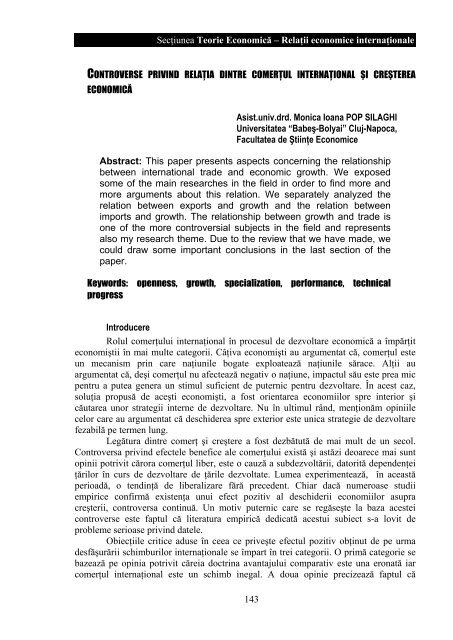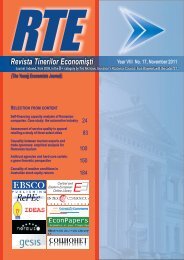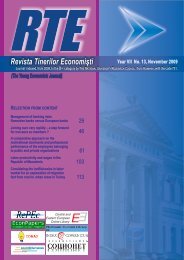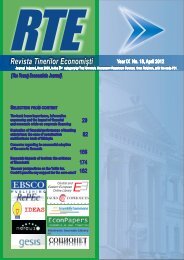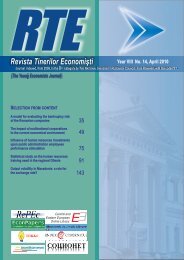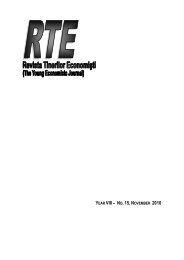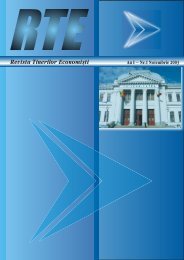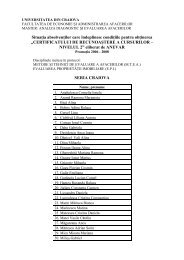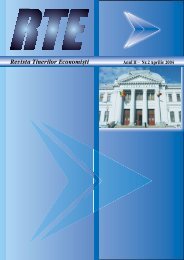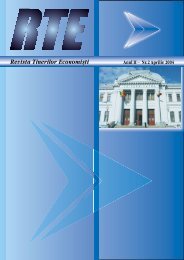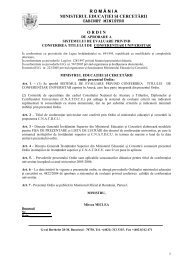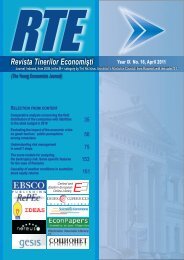Secţiunea Teorie Economică – Relaţii economice internaţion<strong>al</strong>eCONTROVERSE PRIVIND RELAŢIA DINTRE COMERŢUL INTERNAŢIONAL ŞI CREŞTEREAECONOMICĂAsist.univ.drd. Monica Ioana POP SILAGHIUniversitatea “Babeş-Bolyai” Cluj-Napoca,Facultatea <strong>de</strong> Ştiinţe EconomiceAbstract: This paper presents aspects concerning the relationshipbetween internation<strong>al</strong> tra<strong>de</strong> and economic growth. We exposedsome of the main researches in the field in or<strong>de</strong>r to find more andmore arguments about this relation. We separately an<strong>al</strong>yzed therelation between exports and growth and the relation betweenimports and growth. The relationship between growth and tra<strong>de</strong> isone of the more controversi<strong>al</strong> subjects in the field and represents<strong>al</strong>so my research theme. Due to the review that we have ma<strong>de</strong>, wecould draw some important conclusions in the last section of thepaper.Keywords: openness, growth, speci<strong>al</strong>ization, performance, technic<strong>al</strong>progressIntroducereRolul comerţului internaţion<strong>al</strong> în procesul <strong>de</strong> <strong>de</strong>zvoltare economică a împărţiteconomiştii în mai multe categorii. Câţiva economişti au argumentat că, comerţul esteun mecanism prin care naţiunile bogate exploatează naţiunile sărace. Alţii auargumentat că, <strong>de</strong>şi comerţul nu afectează negativ o naţiune, impactul său este prea micpentru a putea genera un stimul suficient <strong>de</strong> puternic pentru <strong>de</strong>zvoltare. În acest caz,soluţia propusă <strong>de</strong> aceşti economişti, a fost orientarea economiilor spre interior şicăutarea unor strategii interne <strong>de</strong> <strong>de</strong>zvoltare. Nu în ultimul rând, menţionăm opiniilecelor care au argumentat că <strong>de</strong>schi<strong>de</strong>rea spre exterior este unica strategie <strong>de</strong> <strong>de</strong>zvoltarefezabilă pe termen lung.Legătura <strong>din</strong>tre comerţ şi creştere a fost <strong>de</strong>zbătută <strong>de</strong> mai mult <strong>de</strong> un secol.Controversa privind efectele benefice <strong>al</strong>e comerţului există şi astăzi <strong>de</strong>oarece mai suntopinii potrivit cărora comerţul liber, este o cauză a sub<strong>de</strong>zvoltării, datorită <strong>de</strong>pen<strong>de</strong>nţeiţărilor în curs <strong>de</strong> <strong>de</strong>zvoltare <strong>de</strong> ţările <strong>de</strong>zvoltate. Lumea experimentează, în aceastăperioadă, o ten<strong>din</strong>ţă <strong>de</strong> liber<strong>al</strong>izare fără prece<strong>de</strong>nt. Chiar dacă numeroase studiiempirice confirmă existenţa unui efect pozitiv <strong>al</strong> <strong>de</strong>schi<strong>de</strong>rii economiilor asupracreşterii, controversa continuă. Un motiv puternic care se regăseşte la baza acesteicontroverse este faptul că literatura empirică <strong>de</strong>dicată acestui subiect s-a lovit <strong>de</strong>probleme serioase privind datele.Obiecţiile critice aduse în ceea ce priveşte efectul pozitiv obţinut <strong>de</strong> pe urma<strong>de</strong>sfăşurării schimburilor internaţion<strong>al</strong>e se împart în trei categorii. O primă categorie sebazează pe opinia potrivit căreia doctrina avantajului comparativ este una eronată iarcomerţul internaţion<strong>al</strong> este un schimb ineg<strong>al</strong>. A doua opinie precizează faptul că143
Revista Tinerilor Economiştiexporturile ţărilor în curs <strong>de</strong> <strong>de</strong>zvoltare eşuează în a stimula <strong>de</strong>zvoltarea datorită unuiefect multiplicator slab a comerţului şi datorită unei radiaţii <strong>din</strong>amice mici rezultate <strong>din</strong>comerţ. Acest argument este orientat în primul rând spre produsele primare. A treiaopinie este aceea că prospectele <strong>de</strong> export a ţărilor în curs <strong>de</strong> <strong>de</strong>zvoltare, în primul rând<strong>al</strong>e exporturilor <strong>de</strong> produse primare, sunt sărace şi preţurile acestor exporturi au scăzutîn comparaţie cu preţurile mărfurilor exportate <strong>de</strong> ţările <strong>de</strong>zvoltate. În sprijinul acestorafirmaţii, economiştii au adus argumente convingătoare şi au dat exemple <strong>de</strong> ţări careau avut pier<strong>de</strong>ri în urma implicării lor în schimburile internaţion<strong>al</strong>e.În ciuda tuturor obiecţiilor menţionate anterior, pe termen mediu şi lung, chiarşi în cazul ţărilor în curs <strong>de</strong> <strong>de</strong>zvoltare, în opinia majorităţii speci<strong>al</strong>iştilor, <strong>de</strong>schi<strong>de</strong>reaeconomiilor la schimburile economice externe are efecte benefice.Viziunea pozitivă asupra relaţiei <strong>din</strong>tre comerţ şi creştere economicăaccentuează direct câştigurile care reies <strong>din</strong> speci<strong>al</strong>izarea internaţion<strong>al</strong>ă la care seadaugă suportul adiţion<strong>al</strong> adus la <strong>de</strong>zvoltarea unei ţări <strong>de</strong> un număr mare <strong>de</strong> efecteinduse în interiorul economiei. Schimburile economice internaţion<strong>al</strong>e, conform acesteiviziuni, duc la câştiguri <strong>de</strong> bunăstare şi eficacitate <strong>de</strong> care beneficiază toate ţările,indiferent care sunt situaţiile lor iniţi<strong>al</strong>e, nivelul lor <strong>de</strong> <strong>de</strong>zvoltare, nivelul tehnologicsau dotarea lor cu resurse natur<strong>al</strong>e. Apoi, aceste câştiguri sunt <strong>de</strong> natură diferită înfuncţie <strong>de</strong> provenienţa lor şi speci<strong>al</strong>izare, puse în evi<strong>de</strong>nţă <strong>de</strong> teoriile clasice sauavantajele unei pieţe mai mari, an<strong>al</strong>izate <strong>de</strong> noile teorii <strong>al</strong>e comerţului internaţion<strong>al</strong>.Câştigurile legate <strong>de</strong> speci<strong>al</strong>izare există indiferent <strong>de</strong> politica comerci<strong>al</strong>ă a statului, carepoate să fie mai mult sau mai puţin <strong>de</strong>schisă. Câştigurile nu sunt legate <strong>de</strong> reciprocitateaconcesiilor iar ele se acompaniază în interiorul fiecărei ţări cu efecte redistributiveimportante.Efectele pozitive <strong>al</strong>e comerţului internaţion<strong>al</strong> asupra creşterii economice pot fiînţelese mai bine dacă se studiază separat relaţia exporturi - creştere economică,respectiv relaţia importuri - creştere economică. Vom reda în continuare câteva aspecteteoretice privind aceste relaţii, respectiv câteva rezultate la care s-a ajuns în urma unorstudii empirice. În secţiunea 2 vom prezenta relaţia <strong>din</strong>tre exporturi şi creştereeconomică, prin prisma abordării teoretice dar şi empirice a acestei relaţii iar însecţiunea 3 vom studia relaţia <strong>din</strong>tre importuri şi creştere economică. În ultima secţiuniia articolului, vom expune concluziile pe care le-am extras în urma incursiunii re<strong>al</strong>izate.Relaţia exporturi - creştere economicăMai multe studii teoretice şi empirice au pus în evi<strong>de</strong>nţă importanţa expansiuniiexporturilor asupra creşterii economice. An<strong>al</strong>iza rolului exporturilor asupra creşteriieconomice a constituit un subiect centr<strong>al</strong> <strong>de</strong> preocupare pentru majoritateaeconomiştilor. Gradul ridicat <strong>al</strong> expunerii la concurenţa internaţion<strong>al</strong>ă este orientat spreintensificarea interesului asupra competitivităţii şi asupra <strong>din</strong>amismului exporturiloreconomiilor naţion<strong>al</strong>e. Intensificarea exporturilor <strong>de</strong> produse manufacturate constituie,în primul rând, un semn<strong>al</strong> privind existenţa unei competitivităţi iar în <strong>al</strong> doilea rând, unmijloc <strong>de</strong> fortificare a anticipărilor <strong>de</strong>ci<strong>de</strong>nţilor, care motivaţi <strong>de</strong> câştig <strong>de</strong>productivitate, cresc investiţiile. Competitivitatea unei ţări, în manieră pur gener<strong>al</strong>ă,poate fi <strong>de</strong>finită ca fiind capacitatea ei <strong>de</strong> a atinge anumite obiective interne(îmbunătăţirea activităţii, angajare <strong>de</strong>plină) fără o <strong>de</strong>gradare excesivă a b<strong>al</strong>anţei s<strong>al</strong>ecomerci<strong>al</strong>e. Abordarea cea mai natur<strong>al</strong>ă <strong>de</strong> a exprima competitivitatea unei ţări sebazează pe comparaţia costurilor s<strong>al</strong>e <strong>de</strong> producţie cu cele <strong>al</strong>e princip<strong>al</strong>ilor partenericomerci<strong>al</strong>i. Prin extensie, aceasta revine la a compara preţul exporturilor acelei ţări cu144


